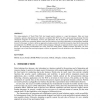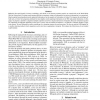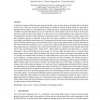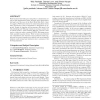IADIS
2004
14 years 4 months ago
2004
The current World Wide Web is essentially a network of documents, a continuously evolving information universe. But the potential of internetworking goes far beyond information ac...
IADIS
2004
14 years 4 months ago
2004
The rising popularity of World Wide Web has brought portal solutions to a rapid development. More and more companies, agencies, departments have replaced or completed their Web si...
EACL
2006
ACL Anthology
14 years 4 months ago
2006
ACL Anthology
Esfinge is a general domain Portuguese question answering system. It tries to take advantage of the great amount of information existent in the World Wide Web. Since Portuguese is...
DMIN
2006
14 years 4 months ago
2006
- With the growing usage of XML in the World Wide Web and elsewhere as a standard for the exchange of data and to represent semistructured data, there is an imminent need for tools...
ECIR
2008
Springer
14 years 4 months ago
2008
Springer
More and more documents on the World Wide Web are based on templates. On a technical level this causes those documents to have a quite similar source code and DOM tree structure. G...
LREC
2010
14 years 4 months ago
2010
Reflecting the rapid growth of science, technology, and culture, it has become common practice to consult tools on the World Wide Web for various terms. Existing search engines pr...
ELPUB
2008
ACM
14 years 4 months ago
2008
ACM
Academics, having written their peer reviewed articles, may at some stage in the make their work Open Access (OA). They can do this by self-archiving an electronic version of thei...
HT
2007
ACM
14 years 4 months ago
2007
ACM
Multi-headed reverse linking (incoming links) is a fundamental concept of Open Hypermedia Systems. However, this bi-directionality has been lost in the move to the World Wide Web ...
VISUALIZATION
1995
IEEE
14 years 6 months ago
1995
IEEE
Navigation in computer generated information spaces may be difficult, resulting in users getting “lost in hyperspace.” This work aims to build on research from the area of ci...
ISSS
1995
IEEE
14 years 6 months ago
1995
IEEE
This paper describes a codesign environment based on the WWW (World Wide Web) and its implementation. Tool invocations and their respective results are linked using hypertext docu...




